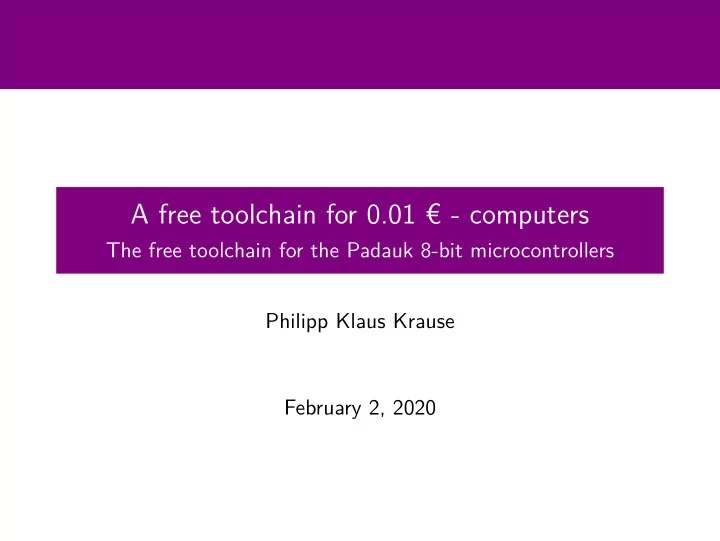

A free toolchain for 0.01 € - computers The free toolchain for the Padauk 8-bit microcontrollers Philipp Klaus Krause February 2, 2020
Table of Contents 1 The Padauk µC 2 Free Hardware 3 Small Device C Compiler 4 TODO
Table of Contents 1 The Padauk µC 2 Free Hardware 3 Small Device C Compiler 4 TODO
Padauk µC Taiwanese manufacturer (rebrand reseller: Puolop) Cheap (down to 0,01 €) Low power Accumulator-based architecture Relatively nice architecture (similar to MCS-51) 60 B to 256 B RAM 0.5 KW to 4 KW program memory (PROM or Flash) Few peripherals (only timer, comparator, ADC, PWM, watchdog) 1 to 8 “Cores” (hardware threads)
Subarchitectures 5 data addr. bits 6 7 8 9 I/O addr. bits 6 12 7 6 hardware threads 1 1 or 2 1 13 11 subarchitecture SYM_85A pdk13 pdk14 pdk15 pdk16 internal name SYM_84B SYM_86B 10 SYM_83A prog. mem. width 13 14 15 16 prog. addr. bits 2, 4 or 8
Hardware Threads Barrel processor Per-thread state: accumulator, stack pointer, program counter, fmag register “Core”, “processing unit”, “FPP”, “FPPA” Lack of instruction support
PMC234 Die
Non-free Tools Mini-C: IDE integrated with compiler/assembler/software for writer/emulator. Assembly with a bit of C-like syntactic sugar. Program writer In-circuit emulator
Free Tools Small Device C compiler (SDCC) with assembler, linker, simulator Easy PDK programmer with fjrm- and software development boards
Table of Contents 1 The Padauk µC 2 Free Hardware 3 Small Device C Compiler 4 TODO
Easy PDK programmer Simple hardware usable with various OSes Fully cupports 6 Padauk-µC so far (PMS15A, PMS150C, PMS154B, PMS154C, PFS154, PFS173) For 12 few more, there already is read-only support https://github.com/free-pdk
Development Boards Minimal boards 4 LED Power supply via programmer, pins oder USB https://github.com/free-pdk/f-eval-boards
Table of Contents 1 The Padauk µC 2 Free Hardware 3 Small Device C Compiler 4 TODO
What is SDCC? C compiler (ANSI C89, ISO C99, ISO C11, ISO C2X) Freestanding implementation or part of a hosted implementation Supporting tools (assembler, linker, simulator, ...) Works on many host systems (GNU/Linux, Windows, macOS, Hurd, OpenBSD, FreeBSD, ...) Targets various 8-bit architectures (MCS-51, DS80C390, Z80, Z180, eZ80 in Z80 mode, Rabbit 2000, Rabbit 3000A, LR35902, TLCS-90, HC08, S08, STM8, pdk14, pdk15, pdk13, PIC14, PIC16) Has some unusual optimizations that make sense for these targets (in particular in register allocation) http://sdcc.sourceforge.net
SDCC for Padauk Supports pdk13, pdk14, pdk15 Functions are non-reentrant by default (local variables at fjxed locations instead of on stack) via --stack-auto whole translation units can be compiled as reentrant; this comes at a signifjcant code size and runtime cost (e.g. 16-bit addition: 34 inst / 40 cycles vs. 6 inst / 6 cycles) Access to I/O-registers via __sfr and __sfr16 Via __reentrant individual functions can be made reentrant,
Code size benefjts of pdk15 improvements 1 0.9 0.8 0.7 Relative code size 0.6 0.5 0.4 0.3 0.2 spadd idxsp spadd+idxsp 0.1 sprel spadd+sprel 0 dhrystone coremark stdcbench
Code size benefjts of pdk15 improvements - all reentrant 1 0.9 0.8 0.7 Relative code size 0.6 0.5 0.4 0.3 0.2 spadd idxsp spadd+idxsp 0.1 sprel spadd+sprel 0 dhrystone coremark stdcbench
Optimal Register Allocation in Polynomial Time Register allocator based on graph-structure theory Optimal register allocation in polynomial time Flexible through use of cost function Provides substantial improvements in code quality Slow compilation for targets with many registers Compilation speed / code quality trade-ofg: –max-allocs-per-node
Regression testing Regression testing of nightly snapshots Tests mostly from fjxed bugs and from GCC Targets architectures: MCS-51, DS390, Z80, Z180, eZ80 in Z80 mode, Rabbit 2000, Rabbit 3000A, LR35902, TLCS-90, HC08, S08, STM8, pdk14, pdk15 Host OS: GNU/Linux, macOS, “Windows” (cross-compiled on GNU/Linux, tested via wine) Host architectures: x86, amd64, ppc, arm ≈ 12000 tests compiled and executed on simulators
LLVM+SDCC Uses LLVM C front- and backend to produce C code to be compiled with SDCC Code compiled with LLVM+SDCC can be mixed with C code compiled with SDCC Allows languages other than C Enables high-level optimizations Experimental, many issues remaining
Table of Contents 1 The Padauk µC 2 Free Hardware 3 Small Device C Compiler 4 TODO
TODO SDCC needs developers Fix SDCC bugs Improve SDCC further in standard compliance, optimizations, debug info, etc Make LLVM+SDCC useable Improve IDE integration Add support for more devices in Easy PDK programmer
Recommend
More recommend